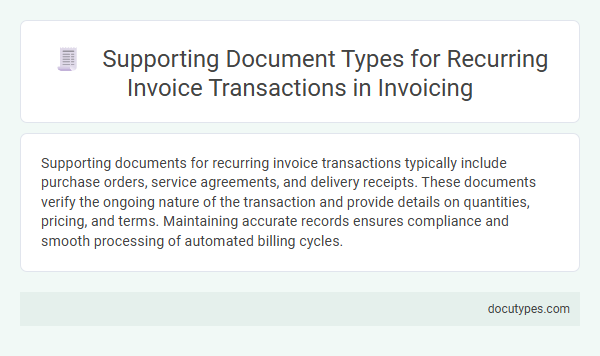Supporting documents for recurring invoice transactions typically include purchase orders, service agreements, and delivery receipts. These documents verify the ongoing nature of the transaction and provide details on quantities, pricing, and terms. Maintaining accurate records ensures compliance and smooth processing of automated billing cycles.
Introduction to Supporting Documents for Recurring Invoices
Supporting documents are essential for verifying and processing recurring invoice transactions. These documents ensure accuracy and compliance in ongoing billing cycles.
- Purchase Orders - They authorize the recurring service or product usage and specify agreed terms.
- Service Agreements - These outline the duration, deliverables, and payment schedule for recurring invoices.
- Payment Receipts - They confirm previous transactions and help track payment history for recurring charges.
Importance of Supporting Documentation in Invoicing
Supporting documentation is essential for validating recurring invoice transactions and ensuring accurate financial records. These documents provide proof of services or products delivered on a recurring basis.
Common types of supporting documents include contracts, purchase orders, and service agreements, which outline the terms of recurring billing. Delivery receipts and timesheets help verify that the invoiced services were performed as agreed. Maintaining comprehensive documentation protects your business from disputes and streamlines the auditing process.
Common Types of Supporting Documents Used
What types of documents support recurring invoice transactions? Common types of supporting documents include purchase orders, delivery receipts, and service agreements. These documents help verify the details and legitimacy of your recurring charges.
Purchase Orders as Supporting Documents
Purchase orders serve as essential supporting documents for recurring invoice transactions. These documents outline the agreed-upon terms, quantities, and pricing, ensuring accurate and consistent billing. You can streamline payment processing and improve record-keeping by linking your recurring invoices to corresponding purchase orders.
Contracts and Service Agreements
Contracts play a crucial role in supporting recurring invoice transactions by clearly defining the terms, payment schedules, and obligations between parties. These legal documents ensure all recurring services or products billed are agreed upon and enforceable.
Service agreements specify the scope, frequency, and rates for ongoing services, forming a foundational basis for automated, recurring invoicing. These agreements reduce billing errors and streamline the invoicing process by setting standardized expectations.
Delivery Notes and Proof of Delivery
Delivery Notes play a crucial role in supporting recurring invoice transactions by providing detailed records of goods shipped to the customer. These documents verify quantities and item descriptions, ensuring accurate billing for each delivery cycle.
Proof of Delivery (POD) confirms successful receipt of goods by the customer and is essential for validating recurring invoices. Your records become more reliable when POD documents are used, reducing disputes and enhancing transaction transparency.
Timesheets or Work Logs for Service-Based Invoices
Timesheets or work logs are essential documents supporting recurring invoice transactions, especially for service-based businesses. These records provide detailed accounts of hours worked and tasks completed, ensuring accuracy in billing.
- Detailed Time Tracking - Timesheets capture the exact hours spent on specific tasks or projects for precise invoicing.
- Verification of Services - Work logs validate that billed services were performed within the invoicing period.
- Consistent Record Keeping - Maintaining timesheets fosters transparency and streamlines recurring invoice processes.
Your recurring invoices gain credibility and reduce disputes when supported by accurate timesheets or work logs.
Receipts and Payment Confirmations
| Document Type | Description | Role in Recurring Invoice Transactions |
|---|---|---|
| Receipts | Official records issued to confirm that payment has been received for goods or services. | Receipts serve as proof of completed payments in recurring invoicing, ensuring transaction accuracy and customer accountability. |
| Payment Confirmations | Notifications or acknowledgments that a payment transaction has been successfully processed. | Payment confirmations validate the payment status of recurring invoices, helping you track ongoing billing cycles and managing accounts receivable. |
Correspondence and Approval Emails
Correspondence emails play a crucial role in supporting recurring invoice transactions by providing a clear record of communication between the vendor and client regarding payment terms and service agreements. Approval emails serve as official authorization from the client to initiate or continue recurring billing cycles, ensuring compliance and reducing disputes. Together, these documents establish transparency and accountability throughout the invoicing process.
What Types of Documents Support Recurring Invoice Transactions? Infographic

